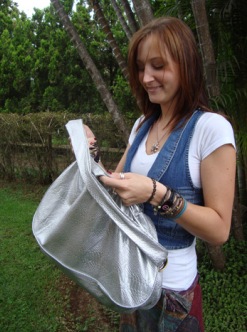
Restoring lives after rape
When Jessica Foord was gang-raped five years ago while on a hike with her father, she vowed not to let the trauma consume her life. The survivor of a crime that reportedly takes place in South Africa every 17 seconds, Foord – who was 21 at the time – was determined to use the experience […]


(Image: JFF)
When Jessica Foord was gang-raped five years ago while on a hike with her father, she vowed not to let the trauma consume her life. The survivor of a crime that reportedly takes place in South Africa every 17 seconds, Foord – who was 21 at the time – was determined to use the experience to help and inspire others.
Foord, originally from Durban, established the Jes Foord Foundation (JFF) in 2009 to assist women who were raped, her very own legacy reminding her of what she has overcome. Three of her rapists received life sentences, while a fourth was put away for 17 years and a fifth was convicted of armed robbery – but they might have got away had she not found the courage to speak out.
“I formed the foundation to help restore lives after rape. I want to educate people and help them realise that there is life after rape,” says Foord.
The foundation has several rape awareness and support projects on the go, including the Kiddipak project for child victims, and the Handbag Project.
The Handbag Project
The Handbag Project aims to get to rape victims as quickly as possible and encourage them to have faith that their experience will not define them. Foord and her team believe that putting dignity back into the victims’ lives is a fundamental step towards recovery.
“The aim is to assist a rape victim during the initial reporting process at the police station. When you are being examined after rape at the police station, you have to leave your clothes and underwear behind,” explains Foord.
“So any item of clothing with forensic evidence on it must be taken from the rape victim, at a time when she already feels so vulnerable. A handbag with comfort items can go a long way towards helping the victim feel a little better.”
The bags may be new or used, and each contains specified items packed inside, such as new underwear, body lotion, a sweet treat, a facecloth, soap, toothpaste, a toothbrush and deodorant.
Anyone can donate a bag for a woman or child – guidelines are available on the JFF website as well as the contact details of collectors. Volunteers for collection or distribution to police stations and trauma centres are also always welcome.
Paying it forward
According to Foord, the most valued item in the handbag is an optional letter with a few words of encouragement to restore some hope to the victim during their traumatic experience. “It can be a few words or an essay but something from your heart to theirs,” she explains.
For example, ‘No matter what has happened you are special, and please don’t let anyone take that away from you. You can, and will, get through this. There are so many people who really care and will help you gain your strength’.
Alta McMaster, the Gauteng co-ordinator for JFF, runs the Handbag Project for the region. She says so often people want to help, but do not know where or how to get involved.
“In a desperate time of need, a small yet loving gesture can make the world of difference,” she says.
Around 10 bags are given to each crisis centre or police station and when they are down to the last two, the foundation supplies more.
‘They take your body, but they don’t take you’
After her traumatic encounter, Foord recalls thinking, “You have taken my body, but you will not take me.”
Committed as ever to change the mindset of ‘victim’ to ‘survivor’, she asserts: “They don’t take your mind, they don’t take your personality and they don’t take you.”
Now 26, she devotes herself full time to fundraising for JFF while also giving motivational talks to schools and organisations with the aim of improving rape education.
She also works with rape counsellors in rural areas and has plans in place to improve the trauma facilities at police stations, district surgeon’s rooms and in courtrooms for those who have been raped.
Door always opened to victims
Foord also saw one of her goals achieved when her foundation launched the Jes Foord Rape Centre at the trauma centre of the Netcare St Augustines Hospital, located in Durban, in June 2011.
“It will be a safe, comforting, clean environment staffed with highly trained, supportive people,” she says.
The centre is open 24 hours a day and survivors will receive immediate care from the on-duty trauma doctor, assisted by the trauma unit’s trained nurses. Only then are the police called to the hospital to take the victim’s statement, whilst one of the JFF counsellors arrives to give assistance and support.
The survivor also receives a handbag from the Handbag Project, and will get ongoing counselling from the foundation.
Patients pay nothing for these services and medical aid is not a prerequisite – all blood tests, evidence collection and medication are given free of charge so the only concern at that point is recovery.
By: Cadine Pillay
Source: www.mediaclubsouthafrica.com
